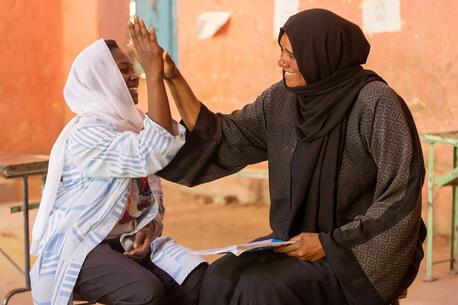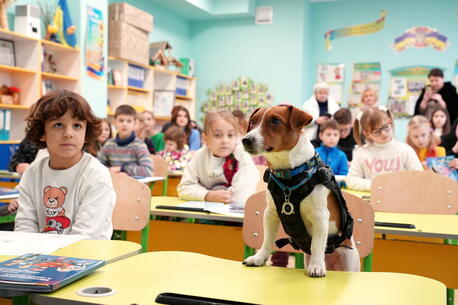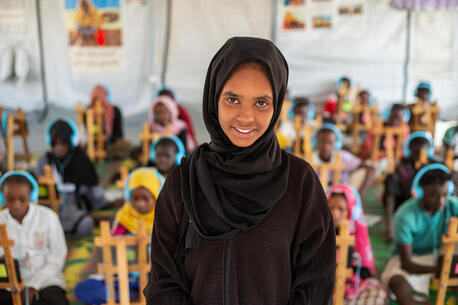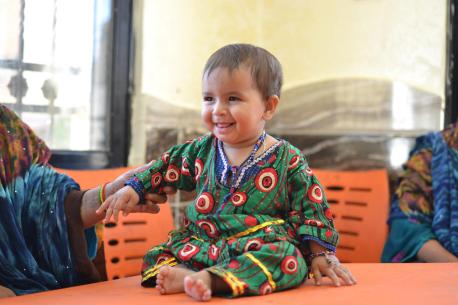
UNICEF in the Middle East and North Africa
UNICEF works with governments and partners in 20 countries in the Middle East and North Africa to improve the lives of children in a region where prolonged conflicts, natural disasters and the socio-economic impacts of COVID-19 continue to threaten their health, safety and well-being. A look at the most pressing needs and how UNICEF is responding.
Tens of millions of children in the Middle East and North Africa (MENA) have long faced difficult circumstances that put their lives, health and safety at risk, as a result of armed conflict, protracted crises and natural hazards.
The impacts of climate change and COVID-19 have only intensified their needs.
And now the war in Ukraine is adding to existing hardships by increasing the price of wheat, fuel and other essential commodities. Children and families were facing severe shortages just weeks after the war's outbreak in late February, raising concerns of a drastic increase in the number of malnourished children across the region.
UNICEF's current humanitarian action plan for children in MENA accounts for a number of challenges across all program areas: health, education, nutrition, child protection and water, sanitation and hygiene (WASH). Here's a look at some of the ways UNICEF is working with governments and other partners in the region to improve the lives of children and families in Syria, Yemen and elsewhere — with some country-specific examples of UNICEF's impact in 2021.
Health
Direct and indirect effects of COVID-19 continue to impact the lives of millions of children in the Middle East and North Africa. A top priority for UNICEF is to continue working with partners to improve children’s access to essential health services — including routine immunizations — and to expand mental health and psychosocial support services, building on results from 2021, which include:
- supporting more than 1.4 million women and children with access to health facilities to prevent COVID-19, including the delivery of personal protective equipment (PPE), lifesaving equipment and medicine to health centers in Algeria, Djibouti, Egypt, Morocco and Tunisia
- helping to rehabilitate 60 triage facilities across nine governorates in Yemen
- raising awareness of COVID-19 vaccination in five refugee camps in Algeria, using posters, banners, leaflets and megaphones
- supporting nearly 300 primary health centers to maintain essential maternal, newborn and child health services in Egypt
- mobilizing more than 100 new organizations in Morocco to support COVID-19 prevention measures and ensure continuity of essential health services
Education
With more than 110 million children across the region missing out on education, UNICEF continues to focus on getting kids back to the classroom, supporting teachers and making sure schools are safe. The goal for 2022 is to help nearly 2,970,000 children access formal or non-formal education, including early learning.
While most schools across the region were closed to prevent the spread of COVID-19 in 2021, UNICEF supported national efforts to improve the coverage and quality of distance learning education — efforts that continue to benefit out-of-school children. Other efforts in 2021 include:
- distributing school bags, stationery and cleaning supplies to schools in Syria to help ensure COVID-19 protocols are observed
- helping to rehabilitate sanitation and hygiene facilities in 152 schools in Tunisia
- connecting over 40,000 children to quality education in Algeria
- delivering 40,000 school bags with learning materials to children — including refugee children — in Djibouti
- providing tablets and smart devices to Syrian refugee children living in settlements in Jordan to support online and distance learning during the COVID-19 pandemic
Nutrition
UNICEF's nutrition programs focus on screening children for malnutrition, treating children suffering from severe acute malnutrition (SAM) and counseling mothers on best feeding practices to help prevent malnutrition.
The screenings are a major part of UNICEF's emergency response in Yemen, where malnutrition is widespread. Last year, UNICEF and partners screened more than 7.5 million children under age 5 in the country, and admitted over 346,000 children with SAM to outpatient treatment programs. In Egypt last year, individual nutrition counseling, community outreach activities and communication campaigns reached hundreds of thousands of primary caregivers for children up to age 2.
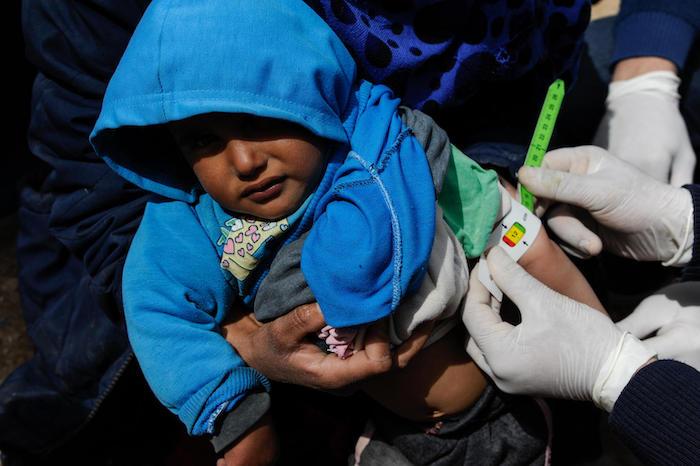
A child is screened for malnutrition at a UNICEF-supported camp for internally displaced persons in rural Ar-Raqqa, Syria. © UNICEF/UNI318715/Wasel
Child Protection
UNICEF works with partners across the region to strengthen social systems and interventions to protect children from harm and to defend their rights to good health, education and equitable opportunities. Child protection priorities include reducing and ultimately ending child marriage, child labor, trafficking, sexual exploitation and abuse, and strengthening gender-based violence risk mitigation, prevention and response.
This work also includes providing psychosocial support to children who have been exposed to violence. UNICEF-supported interventions in Yemen, for example, reach tens of thousands of children every month.
UNICEF also provides direct financial assistance to poor and vulnerable households with young children. In Tunisia, for instance, the program provides a cash transfer of 30 dinar a month (about $10) to help families meet basic needs.
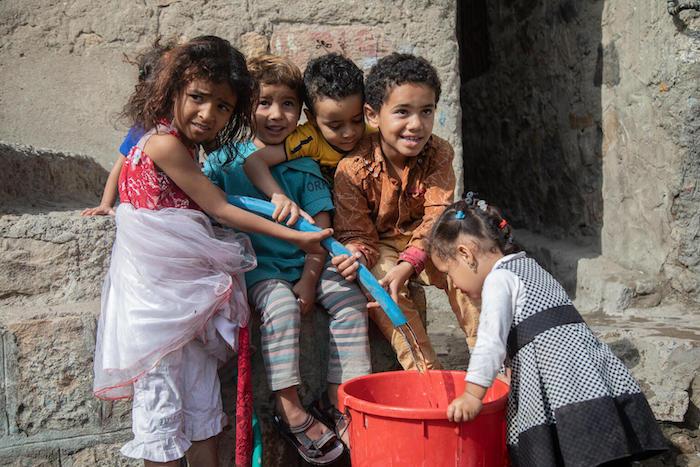
Children fill a pail with safe water in the Al Nusayria neighborhood, Al Mudhaffar district of Taizz governorate, Yemen. UNICEF is helping to improve access by providing the fuel local authorities need to pump water from deep underground. © UNICEF/UN0610698/Al-Basha
Water, Sanitation and Hygiene (WASH)
UNICEF works across the Middle East and North Africa region to improve access to safe water, sanitation and hygiene (WASH) for tens of millions of people in need. Efforts in this area include working with governments and other partners to strengthen municipal water systems and otherwise improve WASH facilities in communities and schools.
Empowering girls, helping children heal
UNICEF works with partners on specific projects and initiatives to provide more specialized support for children throughout the region.
For example, in Egypt — home to 19 million girls under age 20 — UNICEF is a supporter of the National Girls' Empowerment Initiative to amplify girls’ voices and improve their access to skills training and essential services. Known as Dawwie, or "loud voice with an impact and echo" in Arabic, the initiative is led by Egypt's National Council for Childhood and Motherhood in partnership with the National Council for Women, with technical support from UNICEF in collaboration with other partners.
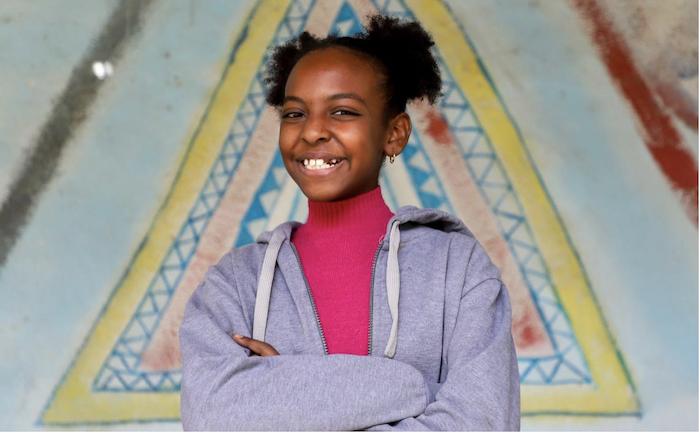
Sama, 13, of Aswan, Egypt, participates in a UNICEF-supported girls empowerment initiative that has been implemented in more than 21 governorates. Sama describes the sessions as having a 'family atmosphere,' with everyone encouraged to talk and to listen. © UNICEF/Egypt 2021/Ahmed Mostafa
The program provides a forum for girls to discuss topics and issues that matter to them, from body integrity and career aspirations to their health and general well-being.
Raghad is a regular "Dawwie" Ambassador in Aswan. "The greatest thing Dawwi provides for every girl is making her feel comfortable and reassured," Raghad says. "She feels that there's someone who's ready to listen, discuss and actively participate."
Another way UNICEF reaches vulnerable children with support services is through Child-Friendly Spaces. These facilities provide a safe and secure environment where children can learn and play and receive psychosocial support. For children affected by conflict, they can provide an opportunity to heal from the scars of war.
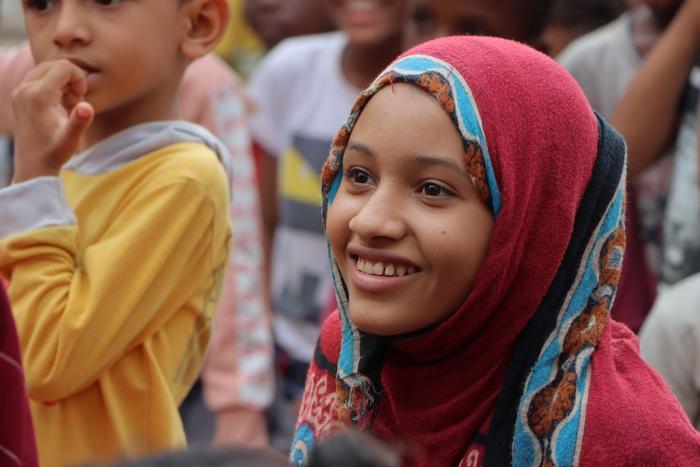
Nora, 11, watches a puppet show at a UNICEF Child-Friendly Space in Aden, Yemen. © UNICEF/YEMEN/2021/ Alfilastini
Learn more about UNICEF's work in the Middle East and North Africa region.
Support UNICEF's mission to save and protect vulnerable children and families. Donate today.
Top photo: A child waits while her mother receives her COVID-19 vaccination at a UNICEF-supported health center serving the Dom community of Jordan, a marginalized group that UNICEF is helping to access essential health services, including immunizations. © UNICEF/UN0582525/Al Jabari
